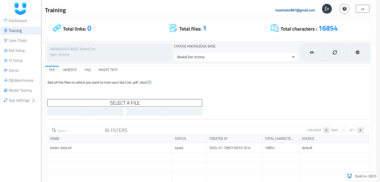Datadog MCP Server
English (This Document) | 日本語
MCP Server for Datadog API, enabling log search, trace span search, and trace span aggregation functionalities.
Features
- Log Search: Search and retrieve logs from Datadog with flexible query options
- Trace Span Search: Search for distributed trace spans with various filtering options
- Trace Span Aggregation: Aggregate trace spans by different dimensions for analysis
Tools
search_logs- Search for logs in Datadog
- Inputs:
filterQuery(optional string): Query string to search logs (default: “*”)filterFrom(optional number): Search start time as UNIX timestamp in seconds (default: 15 minutes ago)filterTo(optional number): Search end time as UNIX timestamp in seconds (default: current time)pageLimit(optional number): Maximum number of logs to retrieve (default: 25, max: 1000)pageCursor(optional string): Pagination cursor for retrieving additional results
- Returns: Formatted text containing:
- Search conditions (query and time range)
- Number of logs found
- Next page cursor (if available)
- Log details including:
- Service name
- Tags
- Timestamp
- Status
- Message (truncated to 300 characters)
- Host
- Important attributes (http.method, http.url, http.status_code, error)
search_spans- Search for trace spans in Datadog
- Inputs:
filterQuery(optional string): Query string to search spans (default: “*”)filterFrom(optional number): Search start time as UNIX timestamp in seconds (default: 15 minutes ago)filterTo(optional number): Search end time as UNIX timestamp in seconds (default: current time)pageLimit(optional number): Maximum number of spans to retrieve (default: 25, max: 1000)pageCursor(optional string): Pagination cursor for retrieving additional results
- Returns: Formatted text containing:
- Search conditions (query and time range)
- Number of spans found
- Next page cursor (if available)
- Span details including:
- Service name
- Timestamp
- Resource name
- Duration (in seconds)
- Host
- Environment
- Type
- Important attributes (http.method, http.url, http.status_code, error)
aggregate_spans- Aggregate trace spans in Datadog by specified dimensions
- Inputs:
filterQuery(optional string): Query string to filter spans for aggregation (default: “*”)filterFrom(optional number): Start time as UNIX timestamp in seconds (default: 15 minutes ago)filterTo(optional number): End time as UNIX timestamp in seconds (default: current time)groupBy(optional string[]): Dimensions to group by (e.g., [“service”, “resource_name”, “status”])aggregation(optional string): Aggregation method - “count”, “avg”, “sum”, “min”, “max”, “pct” (default: “count”)interval(optional string): Time interval for time series data (only when type is “timeseries”)type(optional string): Result type, either “timeseries” or “total” (default: “timeseries”)
- Returns: Formatted text containing:
- Aggregation results in buckets, each including:
- Bucket ID
- Group by values (if groupBy is specified)
- Computed values based on the aggregation method
- Additional metadata:
- Processing time (elapsed)
- Request ID
- Status
- Warnings (if any)
- Aggregation results in buckets, each including:
Setup
You need to set up Datadog API and application keys:
- Get your API key and application key from the Datadog API Keys page
- Install dependencies in the datadog-mcp project:
npm install # or pnpm install - Build the TypeScript project:
npm run build # or pnpm run build
Docker Setup
You can build using Docker with the following command:
docker build -t datadog-mcp .
Usage with Claude Desktop
To use this with Claude Desktop, add the following to your claude_desktop_config.json:
{
"mcpServers": {
"datadog": {
"command": "node",
"args": [
"/path/to/datadog-mcp/build/index.js"
],
"env": {
"DD_API_KEY": "<YOUR_DATADOG_API_KEY>",
"DD_APP_KEY": "<YOUR_DATADOG_APP_KEY>"
}
}
}
}
If you’re using Docker, you can configure it like this:
{
"mcpServers": {
"datadog": {
"command": "docker",
"args": [
"run",
"-i",
"--rm",
"-e",
"DD_API_KEY",
"-e",
"DD_APP_KEY",
"datadog-mcp"
],
"env": {
"DD_API_KEY": "<YOUR_DATADOG_API_KEY>",
"DD_APP_KEY": "<YOUR_DATADOG_APP_KEY>"
}
}
}
}
Usage with VS Code
For quick installation in VS Code, configure your settings:
- Open User Settings (JSON) in VS Code (
Ctrl+Shift+P→Preferences: Open User Settings (JSON)) - Add the following configuration:
{
"mcp": {
"servers": {
"datadog": {
"command": "node",
"args": [
"/path/to/datadog-mcp/build/index.js"
],
"env": {
"DD_API_KEY": "<YOUR_DATADOG_API_KEY>",
"DD_APP_KEY": "<YOUR_DATADOG_APP_KEY>"
}
}
}
}
}
If you’re using Docker, you can configure it like this:
{
"mcp": {
"servers": {
"datadog": {
"command": "docker",
"args": [
"run",
"-i",
"--rm",
"-e",
"DD_API_KEY",
"-e",
"DD_APP_KEY",
"datadog-mcp"
],
"env": {
"DD_API_KEY": "<YOUR_DATADOG_API_KEY>",
"DD_APP_KEY": "<YOUR_DATADOG_APP_KEY>"
}
}
}
}
}
Alternatively, you can add this to a .vscode/mcp.json file in your workspace (without the mcp key):
{
"servers": {
"datadog": {
"command": "node",
"args": [
"/path/to/datadog-mcp/build/index.js"
],
"env": {
"DD_API_KEY": "<YOUR_DATADOG_API_KEY>",
"DD_APP_KEY": "<YOUR_DATADOG_APP_KEY>"
}
}
}
}
If you’re using Docker, you can configure it like this:
{
"servers": {
"datadog": {
"command": "docker",
"args": [
"run",
"-i",
"--rm",
"-e",
"DD_API_KEY",
"-e",
"DD_APP_KEY",
"datadog-mcp"
],
"env": {
"DD_API_KEY": "<YOUR_DATADOG_API_KEY>",
"DD_APP_KEY": "<YOUR_DATADOG_APP_KEY>"
}
}
}
}
Datadog API Integration Server
Project Details
- Nozomuts/datadog-mcp
- MIT License
- Last Updated: 4/28/2025
Recomended MCP Servers
An MCP server capable of interacting with the Box API

MCP server that interacts with Obsidian via the Obsidian rest API community plugin
MCP Server for TaskWarrior!

individual test mcp server

Non-Invasive goroutine inspector

MCP server to interact with Redis Server, AWS Memory DB, etc for caching or other use-cases where in-memory...
Agentic abstraction layer for building high precision vertical AI agents written in python for Model Context Protocol.

A MCP server implementation for hyperbrowser
 From vibe coding to vibe deployment. UBOS MCP turns ideas into infra with one message.
From vibe coding to vibe deployment. UBOS MCP turns ideas into infra with one message.





